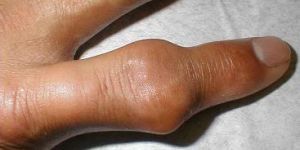Article
Gout Associated With Increased Risk of Cancer
Author(s):
Gout is associated with a significantly increased risk of cancer, particularly prostate cancer in men, a recent study finds.

Gout is associated with a significantly increased risk of cancer, particularly prostate cancer in men, a recent study finds. The study, whose data source was the National Health Insurance database of Taiwan, was published online last month by Joint Bone Spine.
The researchers looked at data from 2000 to 2008 for individuals who were at least 20 years old and had no history of malignancy. In all, 694,361 patients were included, 25,943 of whom had a history of gout. The mean age of the participants was 42.3, and 51.2% were male.
During 5,471,272 patient-years of follow-up, cancer was detected in 24,088 patients (1,745 with gout and 22,343 controls). Most frequently detected were liver, lung, and colon cancers. The incidence of cancer was significantly higher for gout patients than controls (8.7 vs. 4.2 cases per 1000 patient-years). After adjusting for age and sex, gout was determined to be associated with a hazard ratio of 1.15 for cancer. The condition was most closely associated with prostate cancer, with an age- and sex-adjusted hazard ratio of 1.71. However, gout was associated with an inverse, though insignificant age- and sex-adjusted hazard ratio for breast cancer of 0.81.




